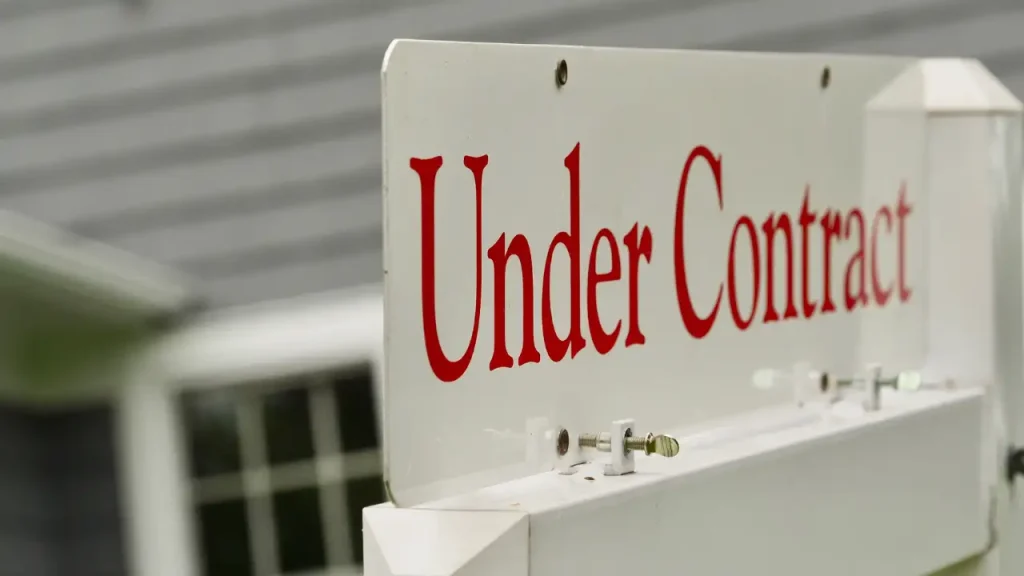When searching for a commercial property, you’ve likely encountered listings labeled “under contract” or “active under contract.” But what does this actually mean? Whether you’re buying or selling commercial real estate, clearly understanding these terms can help you navigate your transaction with confidence.
Table of Contents
ToggleWhat Does “Under Contract” Mean in Real Estate?
In real estate, a property labeled under contract means the buyer and seller have signed a purchase contract agreeing on terms, but the sale isn’t complete yet. The property is on its way to closing, subject to contingencies like inspection, financing, or appraisal.
What Does “Under Contract” Mean in Commercial Real Estate?
In commercial real estate, when a property is marked under contract, it indicates that the buyer and seller have agreed on the sale terms, and both parties have signed a purchase agreement. However, the transaction isn’t finalized yet. The commercial property is in a critical stage on the path to closing, where contingencies—such as inspections, financing approvals, or property appraisals—must still be satisfied.
It’s important to recognize that a property under contract is typically no longer open to new offers, although some agreements may permit backup offers. During this period, the property is off the active market while the buyer completes necessary due diligence.
I recall working with a client excited about securing a commercial building for their expanding business, only to discover the financing contingency required additional lender verifications. That waiting period felt especially challenging! But after the inspection and appraisal were approved, everything proceeded smoothly. It was a great reminder that under contract means progress, but it’s not a finalized deal quite yet.
The Process After a Commercial Property Is Under Contract
Once a commercial property goes under contract, the detailed behind-the-scenes work begins. The buyer typically deposits earnest money into escrow to demonstrate commitment and good faith. This deposit is securely held until the closing date. Next, the buyer arranges property inspections to ensure the commercial space meets their expectations regarding structural integrity, compliance, and suitability for business needs.
Simultaneously, if financing is involved, the lender reviews financial details, verifying business income, creditworthiness, and ordering an appraisal to confirm the property’s market value. Should the inspection or appraisal uncover issues, both parties may renegotiate terms or, in some instances, the contract could be terminated.
This critical phase involves close coordination between brokers, lenders, inspectors, attorneys, and any relevant specialists to satisfy all contingencies before reaching the final closing. Clear communication and patience throughout this period are essential to smoothly progressing toward the completion of the sale.
Common Contingencies in Commercial Real Estate Deals
When a commercial property goes under contract, most agreements include specific contingencies that must be met before the sale can close. These protect both the buyer and seller, ensuring the transaction proceeds only if certain critical conditions are satisfied.
One of the most common is the property inspection contingency. This allows the buyer to hire professionals to evaluate the commercial property thoroughly, examining structural integrity, compliance with local regulations, environmental factors, and mechanical systems. If significant issues emerge, buyers can request repairs, renegotiate terms, or withdraw from the deal without penalty.
Another essential safeguard is the financing contingency, giving buyers adequate time to secure commercial financing. If the buyer’s loan approval falls through, they generally have the option to terminate the contract. Additionally, an appraisal contingency ensures the property’s market value aligns with or exceeds the agreed-upon purchase price, protecting the buyer and lender from financial risk.
Commercial transactions may also include specialized contingencies, such as zoning approval, environmental assessments, or tenant occupancy verification. Timelines for these contingencies vary, with inspection periods commonly ranging from 15 to 30 days, depending on the complexity of the property and the terms of the contract.
According to industry reports, thorough commercial inspections frequently uncover issues that help buyers negotiate better terms or ensure necessary repairs are completed before closing, highlighting the critical role contingencies play in commercial real estate transactions.
Can a Commercial Property Under Contract Still Be Sold?
Typically, once a commercial property is under contract, it’s no longer actively marketed—but that doesn’t mean the opportunity is completely closed. Many commercial purchase agreements allow sellers to consider backup offers. These secondary offers become active only if the initial agreement falls through.
Not all commercial property deals reach closing. Industry data indicates that a notable percentage of commercial real estate transactions may fall through due to issues such as financing challenges, discoveries from property inspections, zoning or environmental concerns, or lower-than-expected appraisal values.
For buyers, submitting a backup offer can be strategically beneficial, especially in competitive commercial markets. For sellers, accepting backup offers provides added security, potentially preventing delays if the primary contract doesn’t close.
How Long Does a Commercial Property Stay Under Contract?
The duration a commercial property remains under contract varies based on the agreement’s terms and the contingencies involved. On average, commercial real estate transactions take between 45 and 90 days from contract signing to closing. Several factors influence this timeline. For example, according to the U.S. Small Business Administration (SBA), securing commercial financing typically requires 30 to 60 days, depending on the complexity of the loan.

Several factors influence this timeline. Quick resolutions to inspections, appraisals, and financing contingencies can accelerate the process. Conversely, complications like extensive repairs, delayed financing approvals, zoning approvals, environmental assessments, or title concerns can prolong the transaction.
Specific contingencies often have predetermined timeframes. For instance, inspection periods may range from 15 to 30 days, while clauses regarding backup offers or rights of refusal might have limited windows, usually between 24 to 72 hours.
What’s the Difference Between Under Contract, Pending, and Contingent?
These real estate terms often confuse buyers and sellers, but they each describe a specific stage in the sale process. A property marked under contract means a buyer and seller have agreed on terms and signed a purchase contract, but certain contingencies still need to be met, like the property inspection, financing, or appraisal.
A contingent property is very similar: the sale depends on one or more conditions being satisfied. You’ll often see listings labeled as active contingent or active under contract — this means the seller can still show the property and possibly accept backup offers while waiting for contingencies to clear.
Once all contingencies are resolved, the status typically moves to pending. At this point, the deal is on track for closing, with fewer remaining steps — usually final paperwork and funding. The property is essentially off the market, with no further offers entertained.
Tips for Buyers and Sellers During the Under Contract Phase
For buyers, the key during the under contract phase is to stay organized and proactive. Schedule your property inspection early, respond promptly to lender requests for documents, and keep in close contact with your real estate agent. This helps avoid delays tied to financing or appraisal.
For sellers, prepare your property for inspections and appraisals to minimize surprises. Keep communication open, and consider accepting backup offers — they provide a safety net if the original contract falls through.
In my experience, the deals that close smoothly are those where both parties stay flexible and focus on solving small issues before they become big ones. Whether it’s a quick repair flagged by the inspector or clarifying a contingency timeline, small efforts can make all the difference.
Ready to Navigate Your Real Estate Journey with Confidence?
If you’re buying or selling a property and want expert guidance through the under-contract process, let a trusted professional help you every step of the way. Contact me today for personalized real estate services in Louisville, Kentucky, and let’s make your move a success!
Final Thoughts
Understanding what under contract means in real estate is essential for both buyers and sellers. This phase marks an important milestone; the deal is on its way to closing, but key contingencies like the property inspection, appraisal, and financing still need to be completed.
Whether you’re making an offer or waiting for one to go through, staying informed and proactive can help you navigate this stage smoothly. By working closely with your agent, responding promptly to requests, and preparing for potential issues, you’ll be well-positioned for a successful sale.
Frequently Asked Questions
Can you make an offer on a property that is under contract?
Generally, no — once a property is under contract, it’s not open for new offers. However, you can submit a backup offer. If the original deal falls through, the seller can consider yours next in line.
What is the difference between under contract and pending?
A property is under contract when a buyer and seller have a signed purchase contract with contingencies still to clear. Pending means all contingencies have been met, and the sale is moving toward closing without further conditions.
How often do contracts fall through?
It’s estimated that about 5% of property sales fall through before closing, often due to financing, inspection, or appraisal issues.
How long do contingencies usually last?
The timeline varies. A property inspection contingency might allow 10 days, while a financing contingency could last several weeks. Some right of refusal clauses require action within 24 to 48 hours.
Can a seller back out of an under-contract deal?
A seller can’t simply back out without cause once under contract. If the buyer fails to meet a contingency, such as securing financing, the seller may have grounds to terminate. Otherwise, backing out could risk legal consequences.

